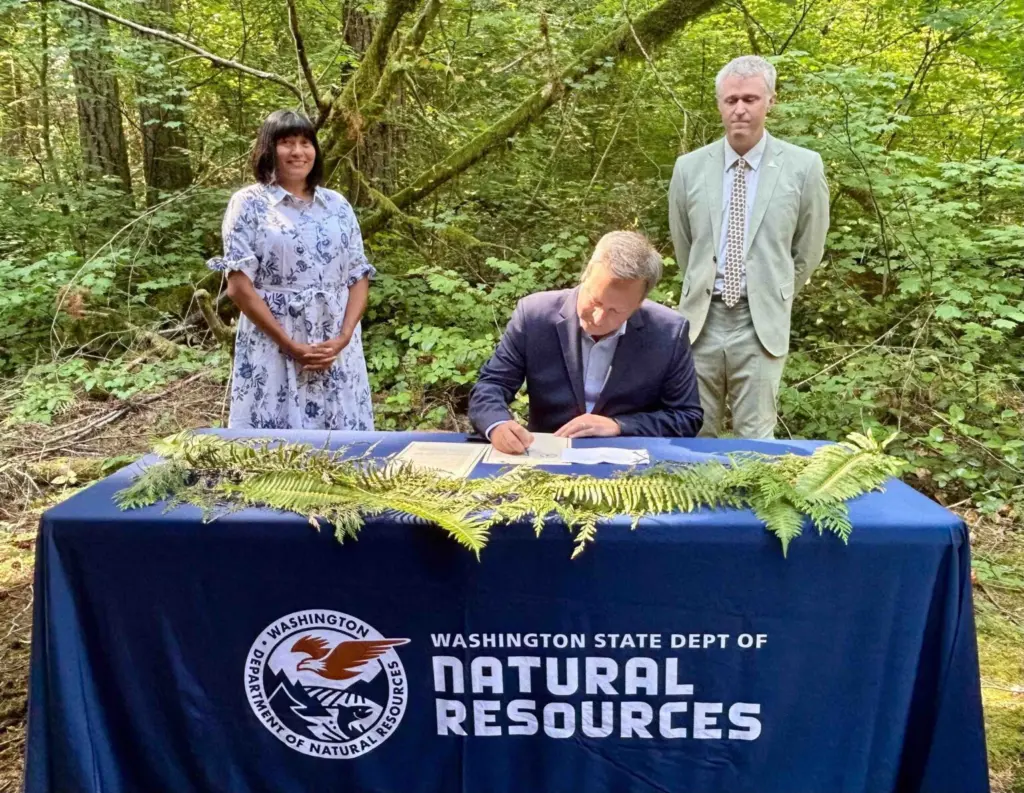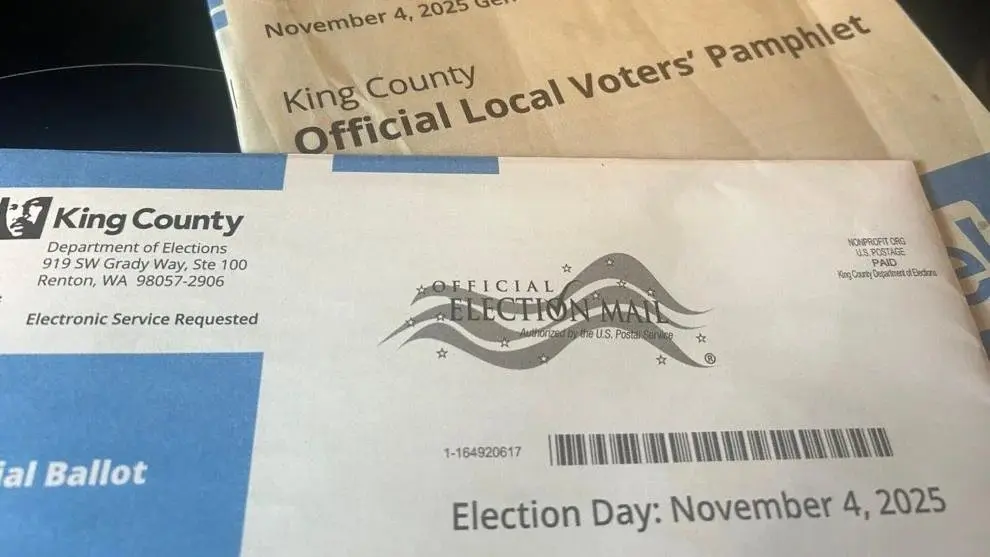OLYMPIA, WA – Washington loggers, school leaders and conservation activists on Wednesday decried the state lands commissioner’s proposal to set aside 77,000 acres of older forests while opening 29,000 acres back up for logging.
Some said the plan, announced by Public Lands Commissioner Dave Upthegrove last week, didn’t do enough to protect the state’s older forests, while others said it would lead to layoffs, business closures and delay of critical school construction projects.
“Not only will this set-aside acreage jeopardize manufacturing jobs in our state, it also threatens beneficiaries with staggering losses in revenue,” said Austin Serrano, a forester who gave public comment during the Board of Natural Resources’ monthly meeting on Wednesday
Criticism of the plan dominated the meeting’s hourlong public comment period.
Under Upthegrove’s plan, 29,000 acres of older forests will remain available for harvest. Most of the roughly two-dozen timber sales that were paused in January will proceed.
Members of the timber industry told the board that Upthegrove’s decision to set aside older forest land would hurt their businesses.
The representatives of logging companies and mills said the bulk of their timber supply comes from Department of Natural Resources lands. Older trees are necessary to make certain specialty wood products like power poles, they said.
Pausing timber sales has already put the state behind schedule for the sustainable harvest level for the year, and the decision to set aside 77,000 acres of highly-profitable older forests creates further uncertainty within the industry, one lumber company representative said.
A representative of another company said their business is looking at laying off the bulk of its 35-member crew until the paused sales move forward and additional timber sales are approved.
Eatonville School District is waiting on its share of revenues from a paused timber sale to help fund a stadium improvement project.
The district is relying on those dollars to cover the interest on a capital levy passed by voters in 2024. State law doesn’t allow districts to use tax revenue to pay the interest, according to Eatonville School Board President Ronda Litzenberger.
“Our community believed in this project because we believed that the trust would be honored. We’re doing everything we can to uphold our end of the promise, and we’re asking for your partnership in upholding the state’s,” Litzenberger said during public comment on Wednesday.
Counties and schools have received logging revenue from the federal government since 1906.
A federal program to offset timber revenue lapsed at the end of 2023, making more school districts dependent on those funds to operate.
“We have a good program now that’s providing good, solid, revenue, predictable revenue,” Mt. Baker School Board President Russ Pfeiffer-Hoyt said after Wednesday’s meeting.
He said the commissioner’s plan “doesn’t make sense” because it will jeopardize that revenue by setting aside older forest land and count on less reliable ways to generate money from forests, like carbon markets.
Chris Reykdal, the state superintendent of public instruction and member of the Board of Natural Resources, supports Upthegrove’s proposal.
Reykdal’s longterm goal is to fully fund Washington’s schools with state dollars and to not have to rely on timber revenue, which he said has been dwindling for years.
“It’s inevitable that they’re going to have to change,” Reykdal said of school funding models after the meeting.
The Washington State Association of Counties, which represents the state’s 39 counties, is evaluating the proposal.
“We’ve had significant concerns about the process that led to the commissioner’s decision,” association spokesperson Hart Stanley said during public comment, adding that last week’s press conference was a surprise to the organization and its members.
“Counties are the primary beneficiaries of these working trust lands and to be excluded from such a significant decision is eroding our ability to maintain trust,” Stanley said.
A spokesperson for the American Forest Resource Council said the regional trade organization was also concerned Upthegrove acted without completing a public process or going through the Board of Natural Resources.
The Department of Natural Resources says it doesn’t need approval from the board or the Legislature to set aside the forestland.
The board sets policies to guide how the Department of Natural Resources manages the state’s nearly 6 million acres of state public land, including about 3 million acres of “trust lands” that produce revenue – mostly from logging – for schools, counties and other parts of government.
The board also approves logging sales.
The 29,000 acres of older forests not set aside for conservation will be enough to honor all of the state’s trust agreements for the next decade, according to the agency.
Upthegrove has said that gives the department time to find alternative methods, like the sale of credits on the carbon market, to make up for any lost revenue.
Meanwhile, conservation activists expressed dismay Wednesday that many of the proposed timber sales for the next five years were going forward. They said the plan failed to protect what they saw as the most ecologically valuable areas of older forest.
“The order was celebrated as a bold action, but when it comes to legacy forests, it’s sort of like a rebranding of the status quo as new conservation,” said Sarah Gardam of Whatcom County.
She was one of several who criticized the maps of the older forests created by Department of Natural Resources staff, saying the acres set aside for conservation are primarily strips of trees that are not part of continuous forests.
Those who voiced support of Upthegrove’s proposal also acknowledged that the maps need work, but said it is a promising concept.
The maps are still being developed and have not yet been finalized, the Department of Natural Resources said.
It is standard practice for board members to not respond to public comment during the meeting. Upthegrove, likewise, did not respond to public testimony during the meeting.
This story first appeared on Washington State Standard.





